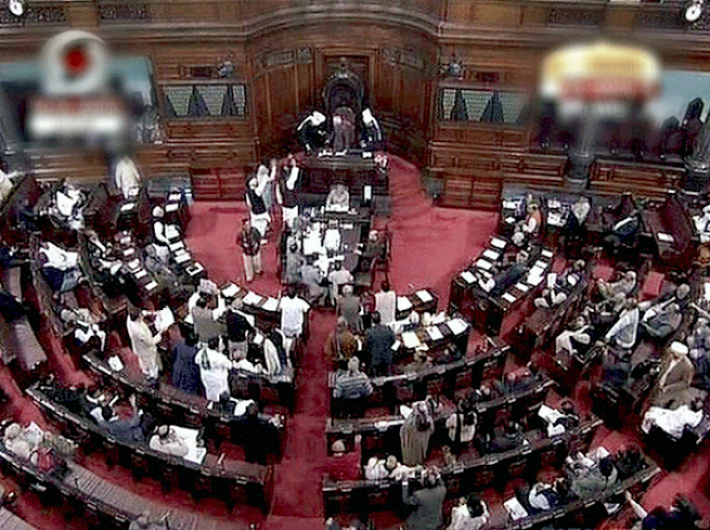Signs are unmistakably ominous. We are increasingly heading towards a society in which democratic institutions would be debilitated to the point of being effete. Look at the manner in which parliament is being disrupted at the expense of issues which have significant bearing on people and their welfare.
If one looks at the conduct of leaders like Anand Sharma, Sitaram Yechury, Pramod Tiwari, Naresh Agarwal, Rajiv Shukla, and Satyavrat Chaturvedi on the one hand and Arun Jaitley, M Venkaiah Naidu and Ravi Shankar Prasad on the other hand in the Rajya Sabha, it resembles a school dominated by a bunch of unruly boys with a hapless headmaster. The situation in the Lok Sabha is different simply because of one party’s dominance.
Since the government needs to pass crucial bills through the Rajya Sabha, the opposition has spotted an opportunity and is exploiting its numerical strength to the hilt by disrupting the house at the slightest pretext. The latest issue pertains to some forced conversions in west UP. These Muslims were enticed to change their religion to Hinduism on the promise of receiving benefits meant for below poverty line (BPL) families. Obviously, they seemed to be motivated more by the desire to overcome their hunger than by the attraction of the religion.
The ideal debate should have been around the collective failure of the polity to provide two square meals to a marginalised section of society which is susceptible to any lure that overcomes their hunger and privation. These people can be as gullible for a jihadi Islamist as to a lunatic fringe of Hindutva. Such a debate requires a serious introspection by political actors. But they seemed more interested in scoring points over each other. This is why the opposition in the Rajya Sabha has been demanding a statement by the prime minister on every sundry issue.
The objective is to pin down the adversary not by the burden of argument and sincerity but by crafty logic and lung power. Hence, such debates lose their meaning and reduce parliament to an extension of political theatrics.
Similarly, the higher judiciary gives the impression of being inaccessible to common people. The cost of justice is so high that it is a major deterrent for an ordinary person to get access to the higher judiciary. What is particularly galling is the fact that the higher judiciary has done little to correct the perception about itself. The manner in which a retired chief justice of India accepted a gubernatorial assignment has only confirmed that perception. Of late, there has been a spate of judgments from the supreme court which have done little to enhance people’s confidence in the judiciary. For instance, the decision to appoint a special investigative team (SIT) to probe the matter of black money or setting up a green tribunal headed by retired judges, instead of experts on the subject, has been seen as a self-serving objective. Though the higher judiciary appears to be proactive in dealing with high-profile cases, its approach to dispensing justice at the lower rung and reducing the pendency remains apathetic.
Though the story of gradual erosion of people’s confidence in two vital institutions of the state –parliament and judiciary – has been built over the years, the rusting of the steel-frame has acquired a new dimension. There is an apparent dearth of officials who could fit the bill for the post of cabinet secretary who heads the country’s bureaucracy. The third extension to cabinet secretary Ajit Seth by prime minister Narendra Modi is only indicative of the massive degeneration and drift in the bureaucracy.
In a situation of vacuum where institutions render themselves meaningless, people tend to gravitate towards individual charisma. Modi’s emergence as the undisputed leader is a manifestation of society’s deep yearning for a powerful leader who can set everything right. And there are all indications that his charm is still not receding as people repose immense faith in him. It will be naïve to think that an individual would be able to correct the malaise single-handedly in a complex society like India. But a political scenario like this would give legitimacy to authoritarianism sooner than later.

